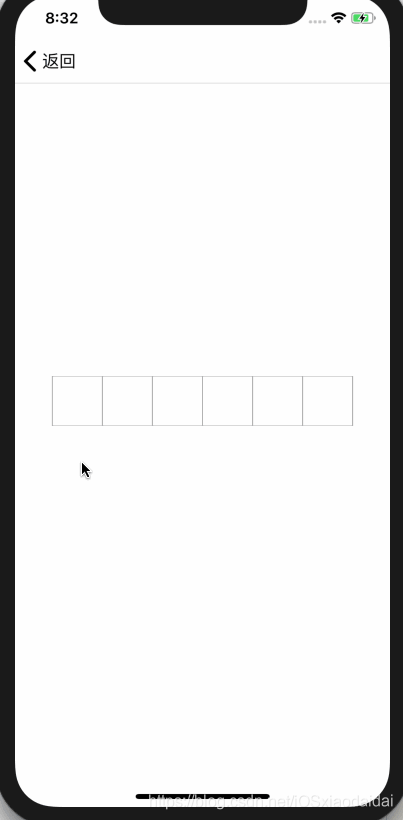标签:idt oat col number conf component bec basic end
开发中很多地方都会遇到密码输入,这时候往往需要根据UI设计自定义。这里遵守UIKeyInput,实现协议中的方法,让自定义View可以进行文字输入;再通过func draw(_ rect: CGRect)绘制现自定义UI;使用配置类来统一接口;使用代理来管理各种输入相关的事件。文章末尾有提供OC和Swift双语的CLDemo下载,这里讲解就使用Swift。
作为一个开发者,有一个学习的氛围跟一个交流圈子特别重要,这是一个我的iOS交流群:196800191,加群密码:112233,不管你是小白还是大牛欢迎入驻 ,分享BAT,阿里面试题、面试经验,讨论技术, 大家一起交流学习成长!
遵守UIKeyInput协议,实现协议中- (BOOL)hasText、- (void)insertText:(NSString *)text、- (void)deleteBackward这三个方法。这里方便阅读,单独抽离成为一个extension。
extension CLPasswordInputView: UIKeyInput { var hasText: Bool { return text.length > 0 } func insertText(_ text: String) { if self.text.length < config.passwordNum { let cs = NSCharacterSet.init(charactersIn: "0123456789").inverted let string = text.components(separatedBy: cs).joined(separator: "") let basicTest = text == string if basicTest { self.text.append(text) delegate?.passwordInputViewDidChange(passwordInputView: self) if self.text.length == config.passwordNum { delegate?.passwordInputViewCompleteInput(passwordInputView: self) } setNeedsDisplay() } } } func deleteBackward() { if text.length > 0 { text.deleteCharacters(in: NSRange(location: text.length - 1, length: 1)) delegate?.passwordInputViewDidChange(passwordInputView: self) } delegate?.passwordInputViewDidDeleteBackward(passwordInputView: self) setNeedsDisplay() } }
根据配置信息,以及当前文字输入,绘制自定义UI,这里讲绘制代码和一些基本代码写在一起,单独抽离成extension。
extension CLPasswordInputView { override func becomeFirstResponder() -> Bool { if !isShow { delegate?.passwordInputViewBeginInput(passwordInputView: self) } isShow = true; return super.becomeFirstResponder() } override func resignFirstResponder() -> Bool { if isShow { delegate?.passwordInputViewEndInput(passwordInputView: self) } isShow = false return super.resignFirstResponder() } var keyboardType: UIKeyboardType { get { return .numberPad } set { } } override var canBecomeFirstResponder: Bool { return true } override var canResignFirstResponder: Bool { return true } override func touchesBegan(_ touches: Set<UITouch>, with event: UIEvent?) { super.touchesBegan(touches, with: event) if !isFirstResponder { _ = becomeFirstResponder() } } func updateWithConfig(config: ((CLPasswordInputViewConfigure) -> Void)?) -> Void { config?(self.config) backgroundColor = self.config.backgroundColor setNeedsDisplay() } override func layoutSubviews() { super.layoutSubviews() setNeedsDisplay() } override func draw(_ rect: CGRect) { let height = rect.size.height let width = rect.size.width let squareWidth = min(max(min(height, config.squareWidth), config.pointRadius * 4), height) let pointRadius = min(config.pointRadius, squareWidth * 0.5) * 0.8 let middleSpace = CGFloat(width - CGFloat(config.passwordNum) * squareWidth) / CGFloat(CGFloat(config.passwordNum - 1) + config.spaceMultiple * 2) let leftSpace = middleSpace * config.spaceMultiple let y = (height - squareWidth) * 0.5 let context = UIGraphicsGetCurrentContext() for i in 0 ..< config.passwordNum { context?.addRect(CGRect(x: leftSpace + CGFloat(i) * squareWidth + CGFloat(i) * middleSpace, y: y, width: squareWidth, height: squareWidth)) context?.setLineWidth(1) context?.setStrokeColor(config.rectColor.cgColor) context?.setFillColor(config.rectBackgroundColor.cgColor) } context?.drawPath(using: .fillStroke) context?.setFillColor(config.pointColor.cgColor) for i in 0 ..< text.length { context?.addArc(center: CGPoint(x: leftSpace + CGFloat(i + 1) * squareWidth + CGFloat(i) * middleSpace - squareWidth * 0.5, y: y + squareWidth * 0.5), radius: pointRadius, startAngle: 0, endAngle: .pi * 2, clockwise: true) context?.drawPath(using: .fill) } } }
自定义UI过程中,对于颜色,间隙,原点大小等,都需要留出接口,方便外部修改。一大堆属性,对于使用者而言,并不友好,因为他并不知道哪些属性是必须的,哪些是非必须的,为了让使用者方便使用,这里单独抽离出一个配置信息类,在内部实现基础配置,同时给出方法,让外部可以修改某些属性。
class CLPasswordInputViewConfigure: NSObject { ///密码的位数 var passwordNum: UInt = 6 ///边框正方形的大小 var squareWidth: CGFloat = 50 ///黑点的半径 var pointRadius: CGFloat = 18 * 0.5 ///边距相对中间间隙倍数 var spaceMultiple: CGFloat = 5; ///黑点颜色 var pointColor: UIColor = UIColor.black ///边框颜色 var rectColor: UIColor = UIColor.lightGray ///输入框背景颜色 var rectBackgroundColor: UIColor = UIColor.white ///控件背景颜色 var backgroundColor: UIColor = UIColor.white class func defaultConfig() -> CLPasswordInputViewConfigure { let configure = CLPasswordInputViewConfigure() return configure } }
外部修改配置的方法,使用闭包,将基本配置回调到外部,同时在外部修改这些属性后,对内部UI进行刷新,这里bloick是局部变量,不会循环引用。
func updateWithConfig(config: ((CLPasswordInputViewConfigure) -> Void)?) -> Void { config?(self.config) backgroundColor = self.config.backgroundColor setNeedsDisplay() }
这里单独创建一个协议,管理各种输入事件,同时通过extension实现这些协议,这样外部就可以选择性的实现这些协议,而不是必须实现。
protocol CLPasswordInputViewDelegate: class { ///输入改变 func passwordInputViewDidChange(passwordInputView:CLPasswordInputView) -> Void ///点击删除 func passwordInputViewDidDeleteBackward(passwordInputView:CLPasswordInputView) -> Void ///输入完成 func passwordInputViewCompleteInput(passwordInputView:CLPasswordInputView) -> Void ///开始输入 func passwordInputViewBeginInput(passwordInputView:CLPasswordInputView) -> Void ///结束输入 func passwordInputViewEndInput(passwordInputView:CLPasswordInputView) -> Void } extension CLPasswordInputViewDelegate { ///输入改变 func passwordInputViewDidChange(passwordInputView:CLPasswordInputView) -> Void { } ///点击删除 func passwordInputViewDidDeleteBackward(passwordInputView:CLPasswordInputView) -> Void { } ///输入完成 func passwordInputViewCompleteInput(passwordInputView:CLPasswordInputView) -> Void { } ///开始输入 func passwordInputViewBeginInput(passwordInputView:CLPasswordInputView) -> Void { } ///结束输入 func passwordInputViewEndInput(passwordInputView:CLPasswordInputView) -> Void { } }
这里简单录制了一个效果,更多请参考CLDemo

为了方便大家学习,这里提供了OC和Swift两种语言分别实现的----->>>CLDemo,如果对你有所帮助,欢迎Star。
原文作者:季末微夏
原文地址:https://www.jianshu.com/p/7305321e10b1
标签:idt oat col number conf component bec basic end
原文地址:https://www.cnblogs.com/fadaijun/p/14122762.html